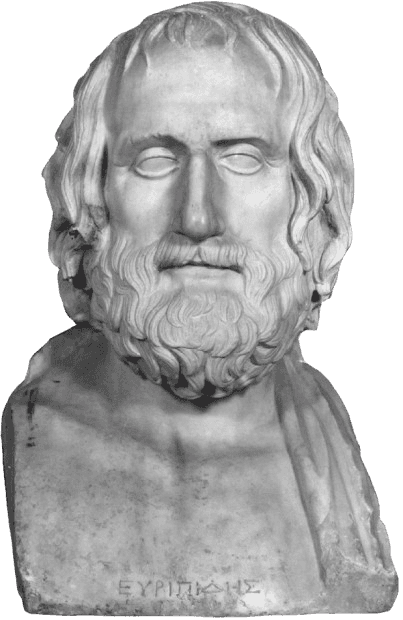Life and achievements
Early life
Euripides was born in Salamis in about 480 BC. His parents, Mnesarchus and Cleito, wished for him to become a great athlete, so they put him into training. An oracle had told him that he would “gain crowns of victory,” and his father supposed he would be an athlete. Yet the plan of his life was such that Euripides was to become a playwright in drama, including tragedy.
Euripides was a young man who had an opportunity to see and experience many aspects of life, including exercising, painting, and philosophizing. As for education, he studied with the masters Prodicus and Anaxagoras and followed the profession of a playwright. Surprisingly, his two unsuccessful marriages and his shy scholarly existence did not hamper his productivity. He built a house in a cave on Salamis, where he set up a library and talked with nature daily.
The self-reflective and passionate characters were the features of the first plays of Euripides as a playwright. In his plays, he usually portrays myth’s heroes and legendary characters as ordinary people. This earned him some applause from his fellow artists and ‘haters’ as they are commonly referred to. However, none of the challenges he faced in his life could bring Euripides down; he continued to write and stage plays that would be well-known for studying people’s characters and gods.
Legacy
By carrying out the tragedies, Euripides contributed to defining the further development of tragedy and introducing ideas into characters and the plot. His plays, which painted the conventional mythological heroes as regular blokes, paved the way for other playwrights to put into practice complex human characters. By focusing on the characters' psychology and naturalizing people, he was innovative for his generation and prepared for the future of drama.
Even though Euripides' plays were awarded the first prize in the City Dionysia only five times, his dramas were in demand in Hellenism. Ancient literature saw them as one of its significant texts. His works were familiar in the ancient and modern world, influencing the approach to seeing Greek tragedy. Thus, Euripides' ability to evoke sympathy for his characters, central themes of revenge, the erratic nature of gods, the status of women, and so on, are still fascinating. Having received a rich education in dramatic art, Euripides' works continued with his generation and subsequent playwrights and the Renaissance of European drama traditions. Their performances and studies continue today because they depicted human life as their author did.
Plays of Euripides have been appreciated for the textual depth, layering, and performative topicality that this European scholar authored.
Milestone moments
Oct 30, 455
First Competition at the City Dionysia
Euripides entered the City of Dionysia, Athens's most crucial dramatic festival, in 455 BC, one year after Aeschylus death.
Although he did not win the first prize in this contest, it was the starting point of his successful career as a tragedian.
The City Dionysia was a significant festival, and for any playwright, being allowed to present a play was a great honor. Euripides' early plays also displayed his creativity in the tragedy genre, as he emphasized the inner lives of his characters.
His plays depicted subjects such as human suffering, divine providence, and the problems of ethical choice.
Though competing with such professional playwrights as Sophocles and Euripides, the latter did not stand still and developed new approaches to the playwriting.
Oct 26, 431
Production" of "idea."
Euripides's play Medea was performed in 431 BC and is one of his most famous plays today.
The "lay M" idea is one of Euripides's earliest tragedies. It revolves around the main character, Medea, and her revenge on her husband, Jason, for cheating on her. Thus, the main themes of the play are betrayal, revenge, and women's suffering.
The character of Medea in the play is quite ambiguous, and the author, Euripides, masterfully reveals the hero's positive and negative traits, making her a tragic heroine.
"Medea" was" entirely" different from the conventional heroic epics, which focused on the character's internal conflict.
The play was highly effective, and it affected later playwrights. It remains a key text in the study of Greek tragedy.
Jul 24, 415
The Trojan Women
The play "The Troja" Women" by Euripes" des, performed in 415 BC, was an anti-war play that depicted Euripidesinst Athenian imperialism.
The play was based on the suffering of the women of Troy after the fall of their city, reflecting on the negative impact of war and human strife.
It was written after the Melian massacre, which occurred while the Sicilian Expedition was being planned, and this undoubtedly influenced Euripides.
The suffering of the women and the play's antplay'sthemes appealed to the spectators, and thus, Euripides continued to be regarded as a socially engaged writer.
Oct 16, 408
Final Competition in Athens
When he died, Euripides' last competition at the City Dionysia in Athens was in 408 BC.
Even though he did not get the first prize, participating in this great festival signified the end of a great career.
The last plays of Euripides, such as "Bacchae" "and "Iph" Genia" in Aulis", were po" posthumously performed in 405 BC to prove that he was still a genius in tragedy.
Thus, these last plays depict the idea of divine retaliation, the suffering of people, and the intricate concept of fate, which only enhances the image of Euripides as a great tragedian.
